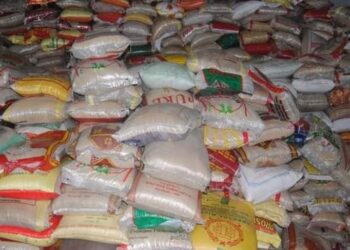The National Biotechnology Development Agency (NABDA), African Agricultural Technology Foundation (AATF) in conjunction with the Open Forum on Agricultural Biotechnology (OFAB) in Africa, on Friday, recognised 10 journalists reporting sciences for their good projection of science work within and outside Nigeria.
Speaking at the 4th Edition of the OFAB Media Award, Gala Nite & Investiture Ceremony, the Coordinator OFAB Nigeria Chapter, Dr. Rose Maxwell Gidado, said the tireless efforts by the celebrated journalists, humanizing science and bringing it to the people for sustainable development in the society and the country at large is what has brought them to limelight.
“It has never been more important that we recognize the work of journalists in science reporting than it is today – as false information is increasingly being spread to undermine the big role science plays in solving our present-day challenges including COVID-19 pandemic, climate change, food insecurity., among others.
“Journalists serve as a bridge between science and society; they play a crucial role in informing and educating the public and policymakers on advances in science and technology including agricultural biotechnology.”
The Chairman of the occasion, the Minister of Science and Technology, Dr. Ogbonnaya Onu, represented by the overseeing Head, Department of Bioresources Technology (FMST) Mr. Agoro Olayiwola urged journalists to avoid fake news and focus on factual news that will promote the deployment of technology in agriculture as the government strategizes on how to feed the teeming population in this era Pandemic.
“Biotechnological tools such as genetic engineering are assisting many countries of the world to address some of the challenges facing their agriculture, but here, the media has also given voice to opponents of technology that threatens the nation’s effort to attain food security. Whilst, it is believed that the media has earned for itself a pride of place in the minds of the common man over the years, I strongly advise that this be maintained,” he added.
During his presentation, the guest speaker and Executive Secretary, Nigerian Press Council Mr. Francis Nwosu also emphasised on ‘Fake News: Why Science journalists must stay with the science’, urging science journalists to be truthful in projecting their reports.
“Fake news is rustled up by individuals or groups to deceive the public, cause ill feelings, influence people’s views, push political agendas, cause disaffection or confusion for specific government policy, or disparage or malign a person’s character. It is indeed written and published with the intent to mislead in order to damage an entity, agency, person, and/or gain financially or politically, using sensationalist, dishonest, or outright fabricated headlines to increase readership.
“Fake news is both anti-ethical to journalism profession and injurious to the polity. A cursory look at our polity will portray one at the mercy of fake news. Like in some other climes, the issue of fake news has become a serious challenge in our country. A school of thought had postulated that there has always been fake news. The difference today is that social media platforms have enabled fake news to spread widely and more quickly than ever before. While social media is the biggest source of fake news, the media gives prominence to it through publication of fictitious stories.
“As science journalists, staying with science places, you in a vantage position as specialised journalists, the public must trust that your information is correct – you must be rigorous, not necessarily the first to publish a story. You must double check your facts and present facts in layman’s terms as much as possible. Make your facts more compelling and with a focus on the human story of the science. Ensure you always point out the lack of rigor and fallacies of the fake news. Lay emphasis on the breadth and depth of scientific consensus that unpins current knowledge,” Nwosu stressed.
He further urged science journalists to enjoin the move against fake news. Adding that, they should continue to help in rebooting science journalism in an age of the internet and ensure that science journalism and science journalists will continue to survive in the new media ecosystem.
Earlier, the acting Director General National Biotechnology Development Agency (NABDA) Professor Alex Akpa lauded the winners, stating that entries of interested science journalists was encouraging. Adding that, “not all entries can be winners. But to me, you are all winners.
“NABDA shall continue to support journalists in the quest for knowledge about this technology, we know that science journalism is new and a bit difficult but we are determined to guide you to ensure that the needed knowledge and exposure that will facilitate your work is made available to you,” Akpa stated.
He was represented by the Director, Agricultural Biotechnology Department NABDA Dr. Nasiru Ibrahim.
Miss Pretty Ngozi Onyejiaku of African Independent Television (AIT), emerged the overall winner with the sum of $500 and a hand gift. While Mrs. Rabi Hope Momoh of Radio Nigeria (FRCN), was awarded for the best radio.



